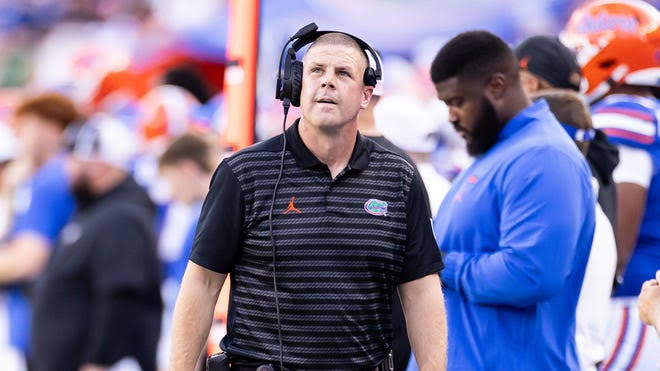
The Florida Gators’ recent decision to part ways with head coach Billy Napier has stirred considerable debate and speculation among fans, analysts, and college football enthusiasts. This move, while not entirely surprising given the team’s performance and various challenges, marks a significant shift for the storied program. Understanding the reasons behind this decision requires a closer examination of Napier’s tenure and the broader context of the Gators’ football program.
Billy Napier was hired by Florida in December 2021, with high expectations surrounding his arrival. The Gators, a program with a rich history of success and a passionate fan base, hoped that Napier, a coach with a track record of success at Louisiana, would bring a new level of stability and competitiveness. Initially, Napier’s hiring was seen as a strategic move to rejuvenate the program and return it to its former glory.
However, Napier’s tenure at Florida has been marked by a series of challenges and disappointments. The 2022 season, his first at the helm, saw the Gators finish with a mediocre 6-7 record. While the team showed flashes of potential, inconsistencies and crucial losses undermined their overall performance. This lackluster showing raised concerns about Napier’s ability to quickly turn around a program that had been underperforming in recent years.
The 2023 season brought more of the same. Despite a promising start, the Gators struggled throughout the year, finishing with a disappointing 5-7 record. The team’s struggles were evident in their inability to secure key victories, particularly in high-stakes games against rivals and other top-tier programs. The inconsistency in performance, combined with a growing number of injuries and lackluster recruiting efforts, led to mounting frustration among fans and stakeholders.
One of the significant issues during Napier’s tenure was his inability to effectively address the team’s defensive woes. The Gators’ defense was often criticized for its lack of discipline, poor tackling, and inability to stop opposing offenses in crucial moments. This recurring problem became a focal point of criticism, as it undermined the team’s chances in several close games.
Recruiting also became a contentious issue. While Napier had some success in attracting talent, the Gators failed to secure a top-tier recruiting class that could immediately impact the program’s performance. In a highly competitive SEC environment, where recruiting plays a pivotal role in determining success, this shortfall was particularly damaging.
Moreover, there was growing dissatisfaction among the fan base and alumni regarding Napier’s game management and in-game adjustments. Critical decisions, such as clock management and play-calling, were often questioned and seemed to contribute to the team’s inability to close out games effectively.
The decision to fire Napier was influenced by the need for a change to restore the program’s competitive edge. Florida’s administration likely weighed the program’s long-term prospects and concluded that a new direction was necessary to achieve the high standards expected of the Gators. The move also reflects the pressure and high expectations that come with leading a premier college football program.
In summary, Billy Napier’s departure from Florida can be attributed to a combination of underwhelming performance, persistent defensive issues, recruiting challenges, and dissatisfaction with game management. While Napier had moments of promise, the overall results did not meet the program’s lofty aspirations. As the Gators seek a new head coach, the focus will be on finding a leader who can address these challenges and restore the team to its place among college football’s elite.
Leave a Reply